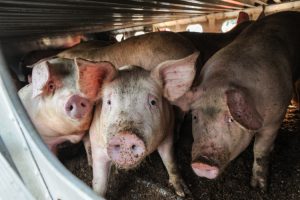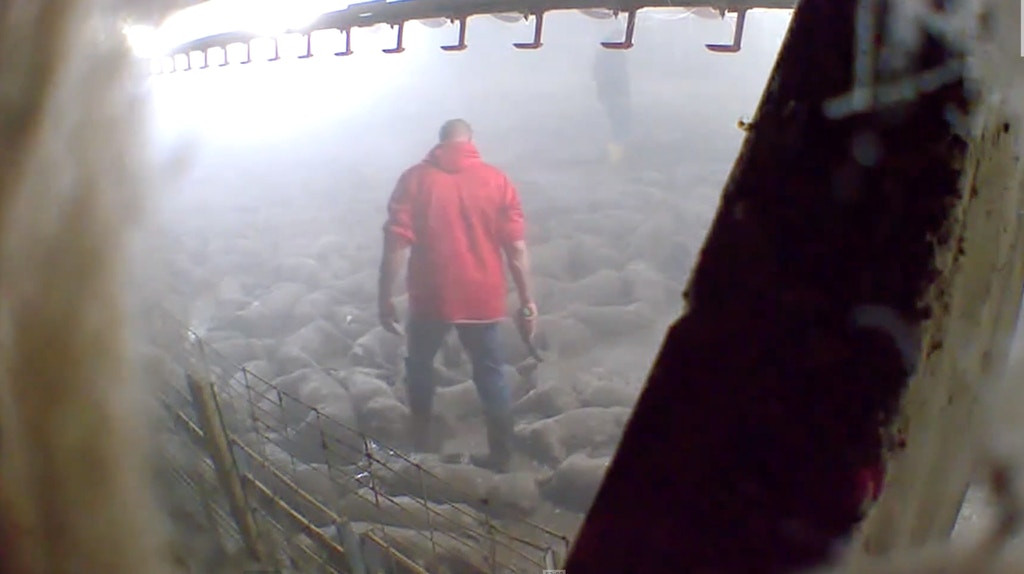
Trigger moments in human history awaken us to injustice and turn the tide of public perception. What happened in Waterloo, Iowa may not have been a watershed moment but as far as human folly, it was a doozy.
Between March and mid-April 2020, as the pandemic surged, managers at the Tyson Foods plant in Waterloo lay bets on how many employees would fall prey to COVID-19. This, while the brass told workers they had “a responsibility to keep working in order to ensure Americans don’t go hungry.”
Across the world, in the city of Guigang in southern China, high-rise pig buildings have risen within Yaji (meaning: Sacred) mountain. These concrete bunkers – up to nine stories high, with a 12-story unit underway – house millions of pigs. From infancy to lifetime confinement to slaughter, these pigs will never see the light of day.
Meanwhile, in early November 2020, Denmark gassed and buried 17 million mink after an outbreak of COVID-19 at a massive factory farm – only to have their rotting, gas-filled bodies start emerging from mass graves.
Are we in Hell yet, Dorothy?
COVID-19 vaccinations are well under way and, despite continuing deaths, it appears we’re finally wresting control from the deadly scourge that has plagued us for a year.
But before we resume life as we once knew it, let’s acknowledge an essential truth: COVID-19 and other pandemics are caused by animal agriculture and our reckless exploitation of the natural world.
“Let’s acknowledge an essential truth: COVID-19 and other pandemics are caused by animal agriculture and our reckless exploitation of the natural world.”
Factory farming is polluting our land, air and water. It’s accelerating species extinction, deforestation, ocean depletion, and global warming. Global biodiversity loss is especially shocking: The World Wildlife Fund (WWF) Living Planet Report 2020 reveals an average 68% decline in the size of animal populations. A fifth of the Amazon rainforest has fallen in just 50 years to make way for cattle and their feed crops, soy and corn; the same scenario repeats itself throughout the world.
“In factory farms, we are creating monster zoonotic viruses that threaten our very survival.”
The despicable events at Tyson, millions of incarcerated pigs, and bloated corpses of discarded mink are but tiny chapters in a story of greed and arrogance writ large. Our food system is built on the slaughter of 70 billion land animals and trillions more fish per year and it is killing our environment.
It’s also killing us. The typical American diet, high in meat, dairy and processed foods, contributes to a host of “lifestyle” diseases: heart disease, arthritis, diabetes, certain cancers, and more. Many of these maladies are now known to cause higher morbidity from COVID-19.
While massive multi-national conglomerates dominate the meat and dairy market and make it difficult to inform the public, the truth is slowly getting out through activists and whistleblowers.
In May 2020, Matt Johnson of animal rights group Direct Action Everywhere (DxE) filmed hundreds of pigs killed by ventilation shutdown – a gruesome practice in which hot air is piped into barns, slowly suffocating animals and roasting them alive. DxE and other groups are now asking California Governor Newsom to enact an immediate moratorium on all new factory farms and slaughterhouses; the petition can be found at nomorefactoryfarms.com.

Credit: Direct Action Everywhere
So, what are we waiting for? The movement toward a plant-based world is a juggernaut that won’t be stopped, but if we are to save our planet, we must speed it up. It’s the only food system that makes sense for our health – and indeed the survival of all life on Earth.
Originally published by Counterpunch Magazine.



